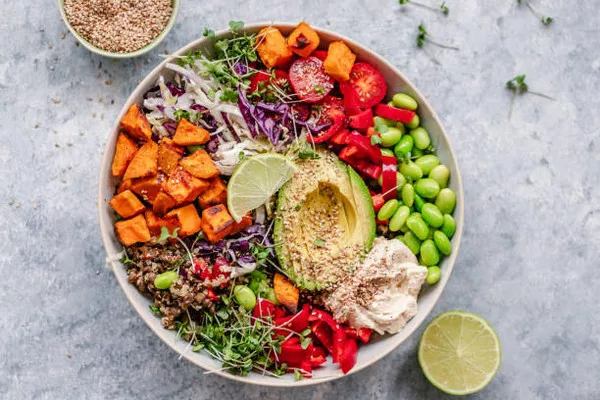When you’re on a weight loss journey, managing hunger can be one of the biggest challenges. Knowing what to eat when you’re feeling hungry is crucial to staying on track and achieving your goals. This article will provide professional advice on how to handle hunger while losing weight, offering practical tips and suggestions to make your journey smoother.
Understanding Hunger and Weight Loss
The Science of Hunger
Hunger is a natural physiological response that signals your body needs food. During weight loss, your body may experience hunger more frequently due to reduced calorie intake. Understanding the difference between true hunger and emotional or habitual eating is essential for effective weight management.
The Role of Metabolism
Your metabolism affects how your body uses energy from food. When you’re losing weight, your metabolism can slow down, making it important to choose foods that support a healthy metabolism and keep you feeling satisfied.
Effective Strategies for Managing Hunger
Stay Hydrated
Why Hydration Matters: Drinking enough water is crucial for overall health and can help manage hunger. Sometimes, thirst is mistaken for hunger.
How Much Water to Drink: Aim for at least 8 glasses of water per day. If you’re active or live in a hot climate, you may need more.
Hydrating Foods: Incorporate water-rich foods into your diet, such as cucumbers, tomatoes, and watermelon.
Prioritize Protein
Benefits of Protein: Protein helps you feel full longer and supports muscle maintenance. Including adequate protein in your meals can reduce hunger pangs.
Sources of Protein: Opt for lean meats, fish, eggs, dairy products, legumes, and plant-based protein sources.
Protein-Rich Meals: Start your day with a protein-rich breakfast, such as Greek yogurt with nuts or an omelet.
Incorporate Fiber
Why Fiber is Important: Fiber promotes satiety and aids in digestion. It slows down the absorption of nutrients, keeping you full longer.
High-Fiber Foods: Choose fruits, vegetables, whole grains, and legumes. Foods like chia seeds, flaxseeds, and oats are excellent sources of fiber.
Meal Ideas: Add a serving of beans to your salad or enjoy a piece of fruit as a snack.
Choose Healthy Fats
Role of Healthy Fats: Healthy fats can help keep you full and satisfied. They also support overall health.
Sources of Healthy Fats: Include avocados, nuts, seeds, and olive oil in your diet.
Snack Ideas: A handful of almonds or a slice of avocado on whole grain toast can be satisfying snacks.
Meal Planning and Preparation
Plan Your Meals
Importance of Meal Planning: Planning your meals in advance helps control portions and prevents impulse eating.
Creating a Meal Plan: Include a variety of protein sources, vegetables, fruits, and whole grains. Plan for balanced meals and healthy snacks.
Meal Prep Tips: Prepare meals in bulk and store them in portion-controlled containers. This helps you avoid unhealthy choices when you’re hungry.
Healthy Snacks
Snacking Smart: Choose snacks that are nutrient-dense and keep you full. Avoid high-sugar or high-fat snacks.
Snack Options: Greek yogurt with berries, a handful of nuts, or sliced vegetables with hummus are great choices.
Portion Control: Use small containers to manage portions and prevent overeating.
Managing Emotional and Habitual Eating
Recognize Emotional Eating
Identifying Triggers: Emotional eating often stems from stress, boredom, or other emotions. Recognize the difference between physical hunger and emotional cravings.
Healthy Alternatives: Find alternative activities to distract yourself from emotional eating, such as going for a walk or practicing mindfulness.
Develop Healthy Eating Habits
Mindful Eating: Pay attention to your hunger cues and eat slowly. Focus on the taste, texture, and satisfaction of your food.
Avoid Distractions: Eat without distractions, such as watching TV or working, to be more aware of your hunger and fullness signals.
See Also: What Can I Eat With Boiled Eggs To Lose Weight
Balancing Your Diet
Nutrient-Dense Foods
Choosing Nutrient-Dense Foods: Opt for foods that provide essential vitamins and minerals without excess calories.
Examples: Leafy greens, colorful vegetables, lean proteins, and whole grains are nutrient-dense choices.
Balanced Meals
Building Balanced Meals: Include a combination of protein, fiber, and healthy fats in each meal to maintain satiety.
Meal Composition: A balanced plate might include grilled chicken, quinoa, and a side of steamed vegetables.
Addressing Common Weight Loss Challenges
Overcoming Plateaus
Understanding Plateaus: Weight loss plateaus are common. Your body may adapt to changes, making further progress challenging.
Strategies to Break Through: Reevaluate your calorie intake and exercise routine. Incorporate variety into your workouts and make sure you’re not undereating.
Handling Social Situations
Navigating Social Events: Plan ahead for social gatherings by choosing healthier options and moderating portion sizes.
Communicating Your Goals: Let friends and family know about your goals. They can support you by offering healthier choices.
Professional Advice and Resources
Consult a Dietitian
Why Seek Professional Help: A registered dietitian can provide personalized advice and help you create a plan that suits your specific needs and goals.
Finding a Dietitian: Look for a licensed dietitian who specializes in weight management and nutrition.
Utilize Technology
Apps and Tools: Use apps to track your food intake, monitor your progress, and stay motivated.
Popular Options: MyFitnessPal, Lose It!, and Yummly are useful tools for meal planning and tracking.
Conclusion
Managing hunger during weight loss involves understanding your body’s signals and making strategic food choices. By staying hydrated, prioritizing protein and fiber, incorporating healthy fats, and planning your meals, you can effectively control hunger and support your weight loss goals. Remember to recognize emotional eating triggers and develop healthy eating habits to maintain your progress. Consulting with a dietitian and utilizing technology can further enhance your journey. With these strategies, you’ll be well-equipped to manage hunger and achieve lasting weight loss success.


